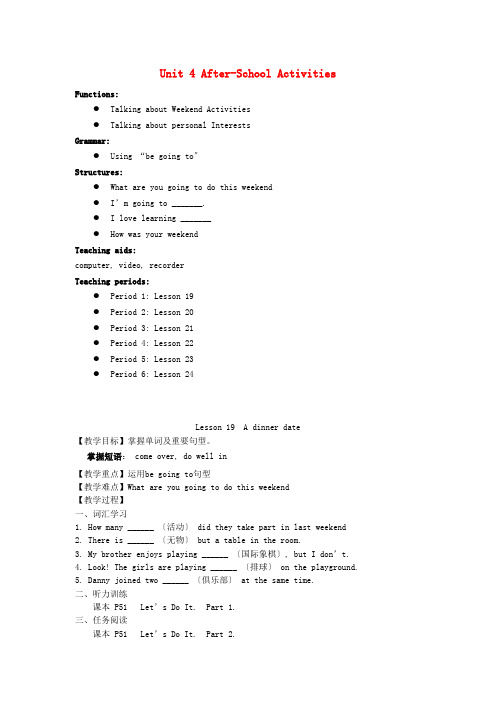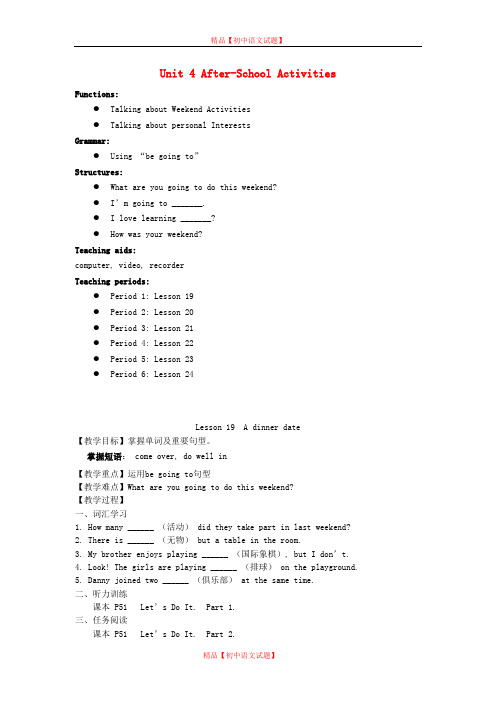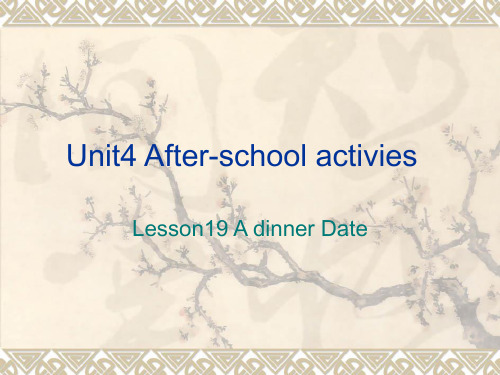【中小学资料】七年级英语下册 Unit 4 After-School Activities综合能力演练 (新版)冀教版
- 格式:doc
- 大小:49.50 KB
- 文档页数:6


Unit 4 After-School Activities Functions:●Talking about Weekend Activities●Talking about personal InterestsGrammar:●Using “be going to〞Structures:●What are you going to do this weekend●I’m going to _______.●I love learning _______●How was your weekendTeaching aids:computer, video, recorderTeaching periods:●Period 1: Lesson 19●Period 2: Lesson 20●Period 3: Lesson 21●Period 4: Lesson 22●Period 5: Lesson 23●Period 6: Lesson 24Lesson 19 A dinner date【教学目标】掌握单词及重要句型。
掌握短语: come over, do well in【教学重点】运用be going to句型【教学难点】What are you going to do this weekend【教学过程】一、词汇学习1. How many ______ 〔活动〕 did they take part in last weekend2. There is ______ 〔无物〕 but a table in the room.3. My brother enjoys playing ______ 〔国际象棋〕, but I don’t.4. Look! The girls are playing ______ 〔排球〕 on the playground.5. Danny joined two ______ 〔俱乐部〕 at the same time.二、听力训练课本 P51 Let’s Do It. Part 1.三、任务阅读课本 P51 Let’s Do It. Part 2.四、1〕课文讲解1. 【原句】 Would you like to come over for dinner tomorrow.【解析】 1)“would like〞“愿意;想要〞,后面接名词、不定代词或动词不定式。

Unit 4 After-School Activities Functions:●Talking about Weekend Activities●Talking about personal InterestsGrammar:●Using “be going to”Structures:●What are you going to do this weekend?●I’m going to _______.●I love learning _______?●How was your weekend?Teaching aids:computer, video, recorderTeaching periods:●Period 1: Lesson 19●Period 2: Lesson 20●Period 3: Lesson 21●Period 4: Lesson 22●Period 5: Lesson 23●Period 6: Lesson 24Lesson 19 A dinner date【教学目标】掌握单词及重要句型。
掌握短语: come over, do well in【教学重点】运用be going to句型【教学难点】What are you going to do this weekend?【教学过程】一、词汇学习1. How many ______ (活动) did they take part in last weekend?2. There is ______ (无物) but a table in the room.3. My brother enjoys playing ______ (国际象棋), but I don’t.4. Look! The girls are playing ______ (排球) on the playground.5. Danny joined two ______ (俱乐部) at the same time.二、听力训练课本 P51 Let’s Do It. Part 1.三、任务阅读课本 P51 Let’s Do It. Part 2.四、1)课文讲解1. 【原句】 Would you like to come over for dinner tomorrow.【解析】 1)“would like”“愿意;想要”,后面接名词、不定代词或动词不定式。

七年级下册第四单元知识点1.What day is it today? 今天星期几?What time is it? 几点了?What is the date?几号?日期是多少?e over for dinner 过来吃晚饭come over 过来,拜访3.be good for 对...有好处be good to 对...友好be good at = do well in 擅长4.have math classed 上数学课5.on Friday 在周五6.this weekend 这周末on weekends 在周末7.be busy doing sth. 忙于做某事8.both 都(两者)+可名复all 都(三者以上),全部9.be going to = will 将要一般将来时10.make new friends 交朋友make new friends with sb. 和...交朋友11.make sb. do sth. 让某人做某事12.have fun 玩的开心have fun doing sth. 开心做某事13.at the same time 同时in time 及时on time 按时14.next week 下星期,下周15.join sb. 加入某人16.after school 放学后17.Acting is fun and useful. 表演有趣且有用。
18.social skills 社会能力19.enjoy doing 喜欢做某事,享受做某事enjoy oneself 玩的开心20.hope to do sth. 希望做某事hope that +从句希望...21.stay in shape 保持体型stay (at) home 呆在家里stay in bed 躺在床上stay healthy 保持健康stay still 保持安静,待着不动22.by the pool 在泳池边23.add up 添加,加上24.find out 找出,查明find 发现,找到(结果)look for 寻找(动作/过程)25.play sports 做运动26.in one’s free time 在某人空闲时间27.exercise one’s mind 锻炼某人的头脑28.be active 积极29.do something active 做一些积极的事something 复合不定代词后+形容词30.play an instrument 弹奏乐器31.on a cold and snowy day 在一个寒冷的有雪的一天on +具体某一天32.listen to music 听音乐33.draw a picture 画画34.read a book 读书35.write a story 写故事36.go on a trip 去旅行37.without 没有(介词prep.)with 有,和,用(介词prep.)38.on the way 在路上on one’s way to sp. 在某人去某地的路上39.例如:for example + 1-2个例子such as +多个例子40.have lunch 吃午餐41.in a hurry 匆忙地hurry up 快点42.make donuts 制作甜甜圈43.How exciting ! 多么令人激动啊!44.surf the Internet 网上冲浪45.help sb. with sth. 在某方面帮助某人with the help of sb. = with one’s help 在某人的帮助下help sb. (to) do sth. 帮助某人做某事help sb. out 帮助某人摆脱困境46.join sb. 加入某人47.would love/like to do sth. 想要做某事Would you like to ...?肯定回答:Yes, I would like/love to.48.talk to sb. on the phone 和某人在电话里交谈49.one pron.一个;num.一代指上文内容:it 同类同物one 同类不同物;同款that 对比结构中,同类e over 过来;顺便来访51.close adj. 接近的,亲近的v.关闭closed adj.关闭的,歇业的be close to 与...接近;与...亲近52.too expensive 太贵的53.need 实义动词:需要need to do sth. 需要做某事need doing sth. 需要被...= need to be done情态动词:需要need do sth.Need ...?回答:54.It‘s three hours away from my house. 距离我家有三个小时。


Unit 4 After-School Activities词句精讲精练词汇精讲1. both(1)代词,意为“两者,单方,两人”。
例如:Both of the flowers are very beautiful. = The flowers are both very beautiful.这两朵花都很漂亮。
(2)描述词,意为“两者的,单方的”。
例如:She wants both dictionaries. 这两本字典她都想要。
Both the answers are wrong. 这两个答案都是错的。
(3)副词,意为“两者,两者都是”,常用于行为动词之前,be动词、助动词、情态动词以后。
例如:They can both dance. 他们俩都会舞蹈。
【拓展】(1)both…and意为“……和……都,既……又……”,用于连接两个并列成分,连接并列主语时,谓语动词该当用复数方式。
例如:Both you and your sister like it very much. 你和你姐姐都非常喜欢它。
(2)both与either都用于两者之间,但是both意为“两者都”,either意为“两者之一”。
例如:Either of the two boys went to the university at last.最初这两个男孩中的一个上了大学。
2.joinjoin作动词,意为“参加,加入”。
宾语有以下几种方式:(1)join + 表示集团或组织的名词,join意为“加入(某集团),成为……(成员)”。
例如:Yao Ming joined the NBA. 姚明加入了NBA。
(2)join + 指人的名词或代词,join意为“加入……当中”。
例如:Will you join us for lunch? 和我们一同吃午饭好吗?(3) join + in + 活动类名词,join in意为“参加(活动)”。
Unit 4 After- School Activities必背单词1. activity n.活动→activities (复数)→active adj.活跃的→action n.行动;活动2. practice n.﹠v. 练习→practice doing sth.练习做某事3. chess n.国际象棋→play chess 下象棋4. both adj. &pron.二者(的)→both…and………和……两者都5. nothing n. ﹠pron. 无事→nothing but 只不过6. volunteer v.自愿帮助→volunteer to do sth. 自愿做某事7. volleyball n. 排球必背短语8. come over for sth. 过来做某事9. do well in…在……方面做得好必背句子10. How about coming over for dinner this evening?今天晚上过来吃晚饭怎么样?必背单词1. join v.参加→join the Party入党2. improve v.提高→improvement n.提高;改善;做出改进3. skill n.技能→skillful adj.熟练的4. meeting n. 聚会→ have/hold a meeting 举行会议→a sports meeting 运动会5. act v. ﹠n.行动;扮演→action n.行动→actor n.男演员→actress n. 女演员6. useful adj.有用的→use v.使用→be useful to sb.对某人有好处7. role n.职能→play a role in 在……中起作用8. team n.队;组→on the team 在队伍里9. shape n. 样子→in the shape of…以……的形状10. level n. 水平→reach a level of…达到……水平11. thinking adj. 思想的12. challenge n. ﹠v. 挑战必背短语13. make friends 交朋友14. at the same time 同时15. enjoy doing…享受……16. stay in shape 保持体型必背句子17. Acting is fun and useful.表演既有趣又有用。
Unit 4 After-School Activities综合能力演练【巩固练习】I. 单项选择。
1.—_________—It was Monday.A.What’s the date? B.What day is it?C.What day was it yesterday? D.When did you go home?2.Come here,Tom.I have _______ things to tell you.A.a lot B.lots of C.a lot of D.both B and C3.Linda does well in _______ English.A.learn B.learns C.to learn D.learning4.Tony _______ his friends plays football every Sunday.A.and B.with C.about D.but5.—How about _______ our club?—Good idea.A.to join B.join C.joining D.join in6.My mother _______ Beijing this weekend.A.is going to B.goes to C.will go to D.both A and C 7.Everybody _______ acting in our class.A.enjoy B.enjoys C.enjoying D.like8.________ is not only interesting but also helpful.A.Reading B.Reads C.Read D.To read9.Nobody can live on the earth ________ water.A.with B.and C.without D.but10.—Is there ________ in your story?—Yes,there is.A.something important B.important somethingC.anything important D.important anything11.—Would you like to go shopping with me?—________.A.That’s right B.That’s all right C.Yes,I’d love to D.Yes,I would12.—________ do you usually come to school?—By bike.A.How B.What C.How often D.When13.—Hi,Jane.What time do you get up ________ weekdays?—I usually get up ________ about six o’clock.A.in;at B.on;at C.at;idea. D.on;on14.Tom is good at _______ basketball,but he can’t play ________ piano.A.playing;the B.play;the C.playing;/ D.play;/15.________ is good exercise to stay in shape.A.Swam B.Swim C.Swims D.SwimmingII. 完形填空In Australia,different people have different ways to enjoy themselves.They also have their own ideas about 1 to pass time.2 children,about 80%,work hard in school because they have to take lots of exams.After school,they don’t want to stay at home reading books any more.3 ,they put aside their school bags and go out to play.Some old people 4 early in the morning.Then they go to the park to 5 .It helps them know what is happening around the world.In the evening,they would prefer to stay at home 6 rather than do anything else.Young people enjoy having a 7 trip on weekends.They go to the mountains to have a picnic or go to the 8 to camp.They usually start on Friday and spend one or two days outside.Then on 9 evening,they start their way back home. 10 seems to be in a hurry,although a busy week is waiting for them again.1.A.what B.how C.when D.why2.A.Some B.Most C.All D.No3.A.However B.Though C.Instead D.Or4.A.get up B.come up C.stay up D.set up5.A.read newspapers B.do sports C.enjoy themselves D.have breakfast 6.A.climbing hills B.watching TV C.going shopping D.going hiking 7.A.boring B.busy C.tiring D.relaxing8.A.forest B.floor C.flat D.factory9.A.Friday B.Sunday C.Tuesday D.Wednesday10.A.Anybody B.Somebody C.Everybody D.NobodyIII. 阅读理解。
AWhat do you usually do at the weekend? Some people like to stay at home,but others like to go shopping or play football.My friend Mr. Smith works in a factory.At the weekend he always does the same thing.On Saturday he washes his car and on Sunday he goes with his family to a village.His aunt and uncle have a big farm there.In autumn,the children help them with the apple harvest.Mr. Smith and Mrs. Smith help in the fields.At the end of the day,they are all hungry and Mr. Smith’s aunt gives them a big meal.1.What do people usually do at the weekend?A.They stay at home.B.Some stay at home,but others go shopping or play football.C.They go shopping.D.They play football.2.What does Mr. Smith do on Sunday?A.He usually watches TV.B.He usually goes to a village with Mrs. Smith.C.He usually washes his car.D.He usually goes to a village with his family.3.Who has a big farm?A.Mr. Smith. B.Mr. Smith’s aunt.C.Mr. Smith’s uncle. D.Mr. Smith’s aunt and uncle.4.Where does Mr. Smith work?A.In a factory. B.On a farm.C.In a department store. D.We don’t know.5.Who makes the big meal?A.Mr. Smith and Mrs. Smith.B.Mr. Smith’s aunt and uncle.C.Mr. Smith’s aunt.D.Mr. Smith’s uncle.BDo you know something about the holiday camps in Hong Kong? The students in Hong Kong used to take part in an English holiday camp in their holidays.And their parents weren’t with them.Though they were very young.Now they still enjoy taking part in many kinds of holiday camps without their parents.Many parents let their children take part in some kinds of holiday camps in order to learn some practical knowledge in their life.And also learn some knowledge about living skills,science,reading and writing... The most important for the children is to learn to look after themselves.Holiday camps in Hong Kong are not so expensive.Most of the families can afford to send their children there for further study,for making their bodies strong... And the government never charges(收费) for them.It is said that students in Hong Kong have much knowledge about many things.Perhaps it has something with the kinds of holiday camps.6.Students in Hong Kong like to take part in the _______.A.holiday campsB.English holiday campsC.science holiday campsD.Chinese holiday camps7.When students in Hong Kong are in the holiday camps,their parents _______. A.must be with themB.have to 100k after them nearbyC.must stay at homeD.aren’t with them8.The most important thing:for the students to take part in the holiday camps in Hong Kong is ________.A.to make their bodies strongB.to learn much knowledge about many thingsC.to learn to look after themselvesD.to have a further study about many subjects9.The cost to take part in a holiday camp is _______.A.very dear B.not cheap C.very high D.low10.The students who often take part in the holiday camps _______.A.must have much knowledge about many thingsB.must be very thinC.must be very tallD.must be very beautifulIV. 书面表达。